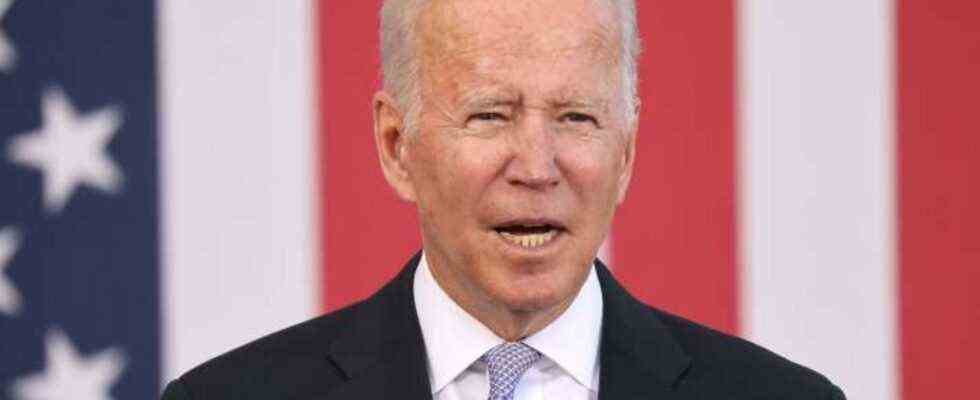Growing conflict
Biden warns China: US will defend Taiwan in case of attack
“Don’t step back” on Taiwan: US President Joe Biden
© Spencer Platt / Getty Images
So far, the US had deliberately left open whether it would defend Taiwan in the event of an invasion by China. Now US President Biden removes all doubts. Does the conflict continue to rock?
In the growing tensions surrounding Taiwan, US President Joe Biden has promised more clearly than his predecessor that the US would defend the island democratic republic in the event of an attack by China. The US government has an “obligation” to do so, Biden said on Thursday evening TV station CNN. The US is not looking for a conflict with China, but Beijing must understand “that we will not take a step back, that we will not change our positions,” said Biden.
In an initial reaction, the Beijing government urged the United States to “be careful”. “China will not compromise when it comes to its basic interests such as sovereignty and territorial integrity,” said Chinese Foreign Ministry spokesman Wang Wenbin.
Taiwan thanks Biden government
The communist leadership in Beijing regards Taiwan as part of the People’s Republic and threatens to conquer it. The US has committed itself to Taiwan’s defense capability – which in concrete terms has so far mainly meant arms deliveries. The question of military assistance in the event of an attack was deliberately left open because Beijing saw it as a violation of its “one-China doctrine”. With this “strategic ambiguity”, Beijing was left unsure of what the US would do in the event of war. When asked by a citizen on the subject, CNN presenter Anderson Cooper hooked a TV interview in Baltimore and asked Biden, facing China, “Are you saying that the United States would defend Taiwan if it tried to attack?” Biden replied, “Yes, we have an obligation to do that.”
In Asia, the United States had previously reserved such a military declaration of support for its close allies Japan and South Korea, where the US armed forces also have a significant military presence. Tensions around Taiwan had increased significantly recently. A record number of Chinese military aircraft had repeatedly broken into Taiwan’s Air Defense Identification Zone (ADIZ) to put air defenses to the test. This zone is not defined internationally, but unilaterally determined.
Taiwan’s government welcomed the American stance. “Since Biden’s inauguration, the US government has consistently demonstrated its solid support for Taiwan through practical steps,” said a presidential spokesman in Taipei. Taiwan is committed to its self-defense and wants to work with like-minded countries to contribute to peace and stability in the Indo-Pacific region and the Taiwan Strait.
Xi Jinping calls for peaceful “reunification”
US policy towards Taiwan is based on the Taiwan Relations Act, which the US Congress passed in 1979. At that time, the USA had established diplomatic relations with China and therefore had to place its relationship with Taiwan on an unofficial level. In the law, the US undertakes to supply Taiwan with “weapons of a defensive nature” and “enable Taiwan to maintain adequate self-defense capabilities”.
Any attempt to “determine the future of Taiwan by other than peaceful means” is also defined as a threat to the Western Pacific and a major concern of the United States. The US armed forces should maintain their ability “to oppose any use of force or other form of coercion that endangers the security or the social and economic system of the Taiwanese people”.
Two weeks ago, China’s state and party leader Xi Jinping increased the pressure on Taiwan by calling for a “reunification,” which is best done peacefully. He warned that a split in Taiwan would have a “bad end”. However, the Taiwanese government rejected the request. The island republic is a “sovereign and independent country and not part of the People’s Republic of China,” said a presidential spokesman. The future of the free country will be decided by the Taiwanese.
Taiwan’s President Tsai Ing-wen also reiterated that the island republic wanted to expand its defense to ensure that no one could force Taiwan to take the route that Beijing was pointing out. This offered “neither a free and democratic life, nor sovereignty” for the Taiwanese, said the president. The Taiwanese people will not bow to the pressure.

